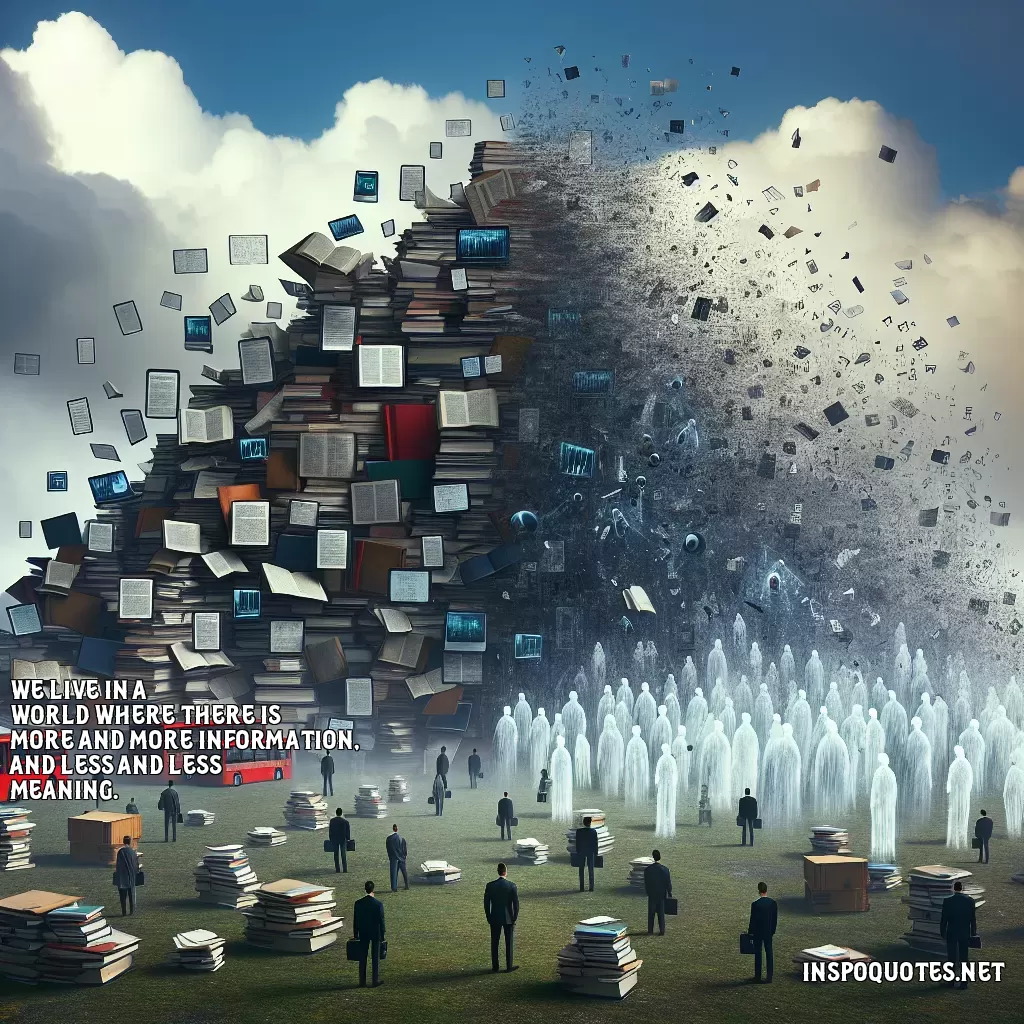
We live in a world where there is more and more information, and less and less meaning.
Author: Hans Rosling
👁️ 28 views

We live in a world where there is more and more information, and less and less meaning.
👁️ 28 views
This quote highlights a paradox of modern life: the abundance of information and the perceived scarcity of meaning. In today's digital age, information is more accessible than ever before. Technology and the internet have revolutionized the way we gather and disseminate knowledge. We can access vast amounts of data with just a few clicks. News, statistics, social media posts, and academic articles are all readily available, creating an overwhelming flood of information that bombards us daily. However, with this exponential growth in information, there arises a challenge in finding meaningful and valuable insights. The sheer volume can lead to information overload, making it difficult to discern what is significant or truthful. In a world where everyone can publish content, misinformation and trivial data can overshadow essential narratives and insights. Furthermore, information without context, interpretation, or relevance often lacks meaning. Meaning is derived not just from data itself, but from understanding, analyzing, and connecting different pieces of information to form a coherent picture. This requires critical thinking and reflection, skills that can be undermined by the fast-paced nature of today's media consumption. Additionally, as we encounter more data, the challenge of extracting personal or philosophical significance becomes more pronounced. Information is abundant, but without a framework to process it, or a purpose to drive inquiry, its impact can be shallow. The quote reflects concerns that despite having access to a wealth of information, we struggle to find depth, purpose, or satisfaction, compelling us to seek better ways to process, prioritize, and apply the information we gather to enrich our lives and understanding.
Quote By: Hans Rosling
Hans Rosling was a distinguished Swedish physician, academic, and public speaker, renowned for his innovative approach to global health and development. Born on July 27, 1948, in Uppsala, Sweden, Rosling embarked on a journey that would not only shape his career but also change the way we perceive global data. He earned his medical degree from the Karolinska Institute and later received a doctorate in international health from the same institution. This academic foundation laid the groundwork for his future endeavors, as Hans Rosling sought to bridge the gap between complex statistics and accessible knowledge for the general public.
Throughout his career, Hans Rosling dedicated himself to studying global health issues, particularly in developing countries. His work often highlighted the stark realities of poverty, infant mortality, and disease, which many oversimplified or misunderstood. In doing so, Rosling founded the Gapminder Foundation in 2005, aiming to combat the misconceptions about global development through the use of statistical data and visualization. His tireless efforts to promote a data-driven understanding of the world earned him widespread recognition, and he became a sought-after speaker inspired by his engaging presentation style.
Rosling is perhaps best known for his TED Talks, where he captivated audiences with his dynamic presentations that utilized his expertise in data visualization. One of his most famous tools was the Trendalyzer software, which transformed static statistics into animated visuals, making complex data accessible and comprehensible. This method allowed Hans Rosling to communicate significant insights about global trends, debunking myths about poverty and development with clarity and enthusiasm.
Beyond his work in academia and public speaking, Rosling authored several influential books, including "Factfulness: Ten Reasons We're Wrong About the World—and Why Things Are Better Than You Think." In this work, he emphasizes the importance of critical thinking and a fact-based worldview. Hans Rosling passed away on February 7, 2017, leaving behind a legacy of insight and inspiration that continues to influence how the world perceives data and global development. Through his life's work, Hans Rosling fundamentally reshaped our understanding of global progress, urging us all to look beyond preconceived notions and appreciate the complexities of our world.